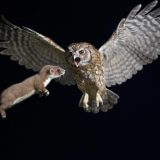In the vast, sun-scorched expanse of the Australian outback, the ultimate Outback Face-Off unfolds. Here, where the red earth stretches endlessly and the heat shimmers on the horizon, two formidable predators engage in a high-stakes battle for survival: the dingo, a cunning and adaptable canine, and the monitor lizard, a swift and powerful reptile.
Add Impressive Nature New Tab theme for Google Chrome and enjoy awe-inspiring beauty of animals, flowers, and nature landscapes every time you open a new tab.
In this harsh and unforgiving landscape, their encounters are a testament to the ingenuity and resilience required to thrive in one of the world’s most extreme environments. This is a story of two outback survivors, each uniquely equipped to navigate the challenges of the arid wilderness.
Outback Face-Off: Meet the Combatants – Dingo and Monitor Lizard
- The Dingo: Australia’s apex predator, the dingo, is known for its intelligence and cooperative hunting strategies. These wild canines are skilled opportunistic feeders, capable of taking down prey much larger than themselves.
- The Monitor Lizard: Equipped with powerful limbs, sharp claws, and a whip-like tail, the monitor lizard is a formidable reptile. Some species, like the perentie, can grow up to 8 feet long, making them one of Australia’s largest lizards.
Survival Adaptations in the Outback Face-Off
- Dingo Adaptations: Dingoes have excellent endurance and acute senses that help them detect prey from afar. Their strong social bonds allow them to hunt in coordinated packs, increasing their chances of success.
- Monitor Lizard Adaptations: Monitor lizards possess a keen sense of smell, aided by a forked tongue similar to that of a snake. Their agility and powerful limbs make them adept climbers and swift attackers.
The Intense Showdown: Strategies and Strengths
When a dingo and a monitor lizard cross paths, the outcome often depends on their respective strengths and tactics.

- Dingo Tactics: Dingoes may rely on speed and endurance to exhaust their prey. They often use distraction techniques and surround their target, making it harder for the lizard to escape.
- Lizard Defenses: Monitor lizards are not without their defenses. With powerful tails and sharp claws, they can inflict significant damage. Some species are also venomous, delivering toxic bites to weaken their opponent.
Overcoming Environmental Challenges
Surviving in the outback means overcoming relentless heat, scarce water sources, and limited food. Both animals have evolved to conserve water and tolerate extreme temperatures.
- Dingoes often seek shade during the hottest part of the day, hunting primarily in the early morning or late evening.
- Monitor Lizards are cold-blooded and regulate their body temperature by basking in the sun or retreating into burrows.
Conservation and Coexistence in the Outback Face-Off
While both species are iconic symbols of the Australian wilderness, they face threats from habitat destruction, human conflict, and invasive species.
- Conservation Efforts: Programs are in place to protect native species and their habitats. Responsible tourism and wildlife sanctuaries contribute to the preservation of these remarkable animals.
Conclusion: Nature’s Relentless Battle
The Outback Face-Off between the dingo and the monitor lizard showcases the raw resilience and adaptability of Australia’s wildlife. Each encounter is a reminder of nature’s balance, where survival is earned through strategy, strength, and instinct.











